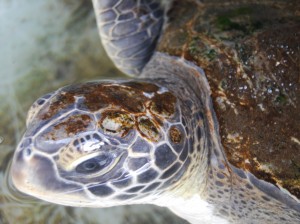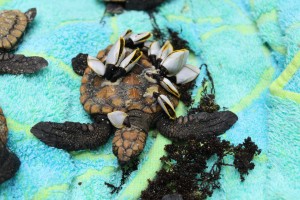 Last < week I attended the Second African Marine Debris Summit, which although focused primarily on the African pollution problem, provided valuable insights into waste on a global scale. Serious and sobering statistics were bandied about such as the 30 to 40 billion tonnes (one million tonnes every 15 minutes) of waste produced annually on a worldwide scale, beaches being major plastics and other waste sinks.
But what particularly struck me (and brought tears to my eyes), was a presentation about the rehabilitation of turtles like gentle Bob, a green turtle rescued by the Two Oceans Aquarium in Cape Town, who had ingested a large amount of plastic and deflated balloons, as Bob's story "humanised" the whole awful garbage debacle.
Of the world's seven sea turtle species, two are vulnerable, two are endangered, two are critically endangered and one is data deficient, which means that there is not enough data to provide an accurate picture of its status.
Last < week I attended the Second African Marine Debris Summit, which although focused primarily on the African pollution problem, provided valuable insights into waste on a global scale. Serious and sobering statistics were bandied about such as the 30 to 40 billion tonnes (one million tonnes every 15 minutes) of waste produced annually on a worldwide scale, beaches being major plastics and other waste sinks.
But what particularly struck me (and brought tears to my eyes), was a presentation about the rehabilitation of turtles like gentle Bob, a green turtle rescued by the Two Oceans Aquarium in Cape Town, who had ingested a large amount of plastic and deflated balloons, as Bob's story "humanised" the whole awful garbage debacle.
Of the world's seven sea turtle species, two are vulnerable, two are endangered, two are critically endangered and one is data deficient, which means that there is not enough data to provide an accurate picture of its status.
 Within just three generations there has been an overall decline of over 80% in sea turtle populations due to factors like beach pollution and the catching of turtles as by-catch. According to Helen Lockhart, Communications and Sustainability Manager of the Two Oceans Aquarium, only one in 1000 hatchlings will survive to adulthood, which makes each one of these little chaps incredibly important.
Within just three generations there has been an overall decline of over 80% in sea turtle populations due to factors like beach pollution and the catching of turtles as by-catch. According to Helen Lockhart, Communications and Sustainability Manager of the Two Oceans Aquarium, only one in 1000 hatchlings will survive to adulthood, which makes each one of these little chaps incredibly important.
Sea turtles play a valuable role in two important ecosystems, the beach or dune system and the marine system, wherein they maintain the health of sea-grass beds and coral reefs, benefiting commercial fisheries like shrimp, lobster and tuna. Because turtle nestings deliver nutrients to beaches, they also help terrestrial vegetation growth, limiting erosion.
For the sake of gentle Bob and other marine creatures we must take better care of our marine environment, for without a healthy ocean there will be no life on land.
Carol. Thanks for showcasing this – we need to show that we are harming the world, more than losing the aesthetic beauty by littering and poor waste management. We are harming the beings that share this planet with us!
Thanks John. Well said. By harming our environment we are doing incalculable harm, not only to ourselves but all the other magnificent creatures who share this incredible planet we call Home!